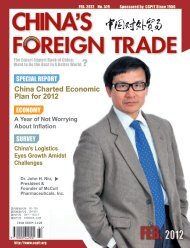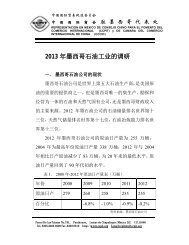ECONOMYFinancial Reform after theCrisis: An Early AssessmentBy Nicolas VéronFinancial reform has been a coredimension of the initial globalpolicy response to the financialturmoil of 2007–08. At thefirst G-20 summit of heads of state andgovernment in November 2008, morethan four-fifths of the action points inthe final declaration were about financialregulation. Obviously, the crisis isnot over at the time of writing, and thecycle of financial reform it triggered isvery far from complete. But it can besaid confidently that the crisis has beentransformational for financial regulatorypolicy, at least in the United States andEurope.One of the key lessons of the crisisis the close interdependence betweenthe detailed features of financial systemsand macroeconomic outcomes.Thus, the tight separation of financialand macroeconomic issues, which isentrenched both in academia and inthe policymaking community, needsto be overcome. Initiatives to betteranalyze “macro-financial” linkages andto conduct “macro-prudential” policyhave mushroomed since the start ofthe crisis, although they generally fallshort of a fully joined-up framework.From this perspective, the focus ofthis paper is financial regulation in anold-fashioned sense, understood as acluster of interrelated policies designedto ensure the proper functioning andintegrity of financial systems. This scopeincludes public regulation and supervisionof bank capital, leverage, liquidity,and risk management; control of moralhazard and financial industry incentives;protection of the customers of financialservices; and the regulation of capitalmarkets. Other reform areas such ascapital-f low controls, prevention ofmoney laundering, and the taxation offinancial activities can overlap with thisagenda, but are not considered here partof it in a strict sense.The general impetus of financialreform as a reaction to the crisis, in theUnited States and Europe, has been towardmore regulation, or re-regulation.This is admittedly too simplistic ageneralization: This policy area is multidimensionaland cannot be reducedto a simple choice between less or moreregulation. Nevertheless, there was aclear turning point in 2008 with the renewedrealization that financial systems,including banking systems, could not beleft to their own devices, both becauseof the large potential economic cost offinancial crises and because public expenditureis often a key component oftheir resolution. For a variety of reasonsthis age-old wisdom was neglected inthe preceding decade in both the UnitedStates and Europe more than in the restof the world, including Australia, Canada,Japan, and emerging economies.Financial regulation is a complexthicket of highly technical policy challenges,often subject to the use of mutuallyincomprehensible jargons even asthey are mutually interrelated. The devilis generally in the details, and elegant20
quantitative models of policy tradeoffsare rarely available. Analyticalframeworks tend to be similarly fragmentedacross different academic silos,including economics, financial research,accounting, political science, and sociology.From an economic research perspective,this is a less mature field thanother policy areas such as fiscal, trade,or labor. Hopefully, the crisis itself willresult in new avenues for research, theresults of which might start to becomeavailable in a few years’ time.The dynamics of financialreformIn the European Union, a distinctdriver of financial reform in the two decadespreceding the crisis was the effortto create a single market for financialservices, particularly after the introductionof the euro in 1999. Landmark correspondingpieces of legislation includethe 1989 Second Banking Directive,which encouraged the creation of crossborderbranches; the 1993 InvestmentServices Directive, which established asingle “passport” regime for investmentbanking operations throughout theEuropean Union; the 2002 Regulationon International Accounting Standards,which paved the way for the EuropeanUnion’s adoption of International FinancialReporting Standards (IFRS) in2005; the 2004 Markets in FinancialInstruments Directive (MiFID), whichbroke the monopoly of national stockexchanges and established the basis forEU-wide competition among tradingplatforms; the 2006 Capital RequirementsDirectives, which transposed theBasel II Accord and paved the way fora harmonized regulatory framework forbank capital requirements; and the 2009Solvency II Directive (the preparationof which started long before the crisis),which established a parallel capitalregulation framework for insurancecompanies.EU harmonization efforts havethemselves been a powerful stimulantor enabler for global regulatory projects.The two most prominent pre-crisis examplesin this respect are IFRS and theBasel II Capital Accord. In the case ofaccounting, the European Union’s decisionto adopt IFRS, made at the politicallevel in 2000, finalized through theabove-mentioned 2002 regulation, andimplemented in 2005–06, was the triggerfor their subsequent adoption by asignificant number of jurisdictions thatnow represent about half of the aggregatemarket capitalization of large companiesworldwide. In the case of BaselII, the European Union was instrumentalin the negotiation of the accord inthe first place, and was among the firstto implement it with the adoption of theCapital Requirements Directives andsubsequent rulemaking in individualmember states. According to the BaselCommittee on Banking Supervision, bySeptember 2011, implementation of theBasel II Accord was complete in 21 ofthe committees 27 member countries,with at least two more countries planningto join in 2012.The IMF and the FSBWhile the G-20 is by its very naturea political body, the coordination ofthe global financial regulatory agendaduring the crisis has been mostly thejoint preserve of the IMF and FSB,these being “the principal institutionsof governance of the global financialarchitecture”. The IMF has played asignificant role through its FinancialSector Assessment Program (FSAP).The FSAP, which is conducted by theIMF alone in developed economies andjointly with the World Bank in developingand emerging economies, is acomprehensive assessment of a country’sfinancial-sector stability. In September2010, the FSAP was made a moreregular feature for 25 jurisdictions, forwhich the assessment will be renewed atleast every five years. This meant an endto the de facto exception under whichsome large countries escaped the scrutinyof the FSAP until the crisis: Thefirst FSAP of the United States startedin June 2008 and was completed inJuly 2010; and the first FSAP of Chinastarted in August 2009 and was completedin June 2011.The FSB’s role is multifaceted andstill to a large extent, a work in progress.It has set up numerous working groupsand coordinates work on multiple fronts,often at the explicit request of G-20leaders. However, the actual work ofstandard setting and rule making generallyremains at the level of specializedglobal authorities. One case in point isthe FSB’s report on the “shadow bankingsystem,” published a week before the2011 G-20 summit in Cannes. Manyof this report’s recommendations areaddressed not to individual jurisdictionsbut to global bodies that are FSBmembers, particularly the Basel Committeeand the International Organizationof Securities Commissions. Suchpatterns mean that assessing the FSB’scontribution to the policy process is farfrom straightforward. In some cases,the FSB’s work can be little more thanreporting initiatives of its members; inother cases, FSB leadership is essentialfor pressing other bodies into taking action.In practice, there appears to be acontinuum of situations between thesetwo extremes.Challenges and outlookIt is far too early to present asettled picture of post-crisis financialreforms and their impact on the globalfinancial system. Huge challenges remainand it is still unclear how theywill be met. First and foremost, thecrisis has not yet been resolved, and theinteraction between crisis managementand long-term reform creates uncertaintiesof its own. Second, in spite ofwidespread calls for “macro-prudential”approaches, the interaction of financialsectorpolicy with other dimensions ofeconomic policymaking remains largelyunsettled. Third, how to effectivelyregulate cross-border financial firmsremains a fundamentally unansweredquestion. Fourth, other reforms will bedifficult to implement in an internationallyconsistent manner, raising concernsabout the possible fragmentation of theglobal financial space. Fifth, the reformswill affect the financial system’s contributionto economic growth in multipleways, which on the whole remain poorlyunderstood.Ongoing crisis managementThe most obvious uncertainty isthat the financial crisis is far from over.Although it was partly overcome in theUnited States in 2009, it is still worseningin Europe and could again spilloverto other parts of the world. This createsa triple risk of forbearance, populism,and irrelevance.21

















